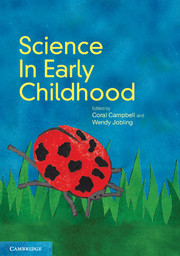Book contents
- Frontmatter
- Contents
- Contributors
- INTRODUCTION
- CHAPTER 1 SCIENCE IN THE NATIONAL EARLY YEARS LEARNING FRAMEWORK
- CHAPTER 2 LEARNING THEORIES RELATED TO EARLY CHILDHOOD SCIENCE EDUCATION
- CHAPTER 3 USING PLAY PEDAGOGY IN THE EARLY YEARS
- CHAPTER 4 TEACHING APPROACHES
- CHAPTER 5 DEVELOPING PEDAGOGICAL PRACTICES FOR SCIENCE TEACHING AND LEARNING WITH 3 AND 4-YEAR-OLD CHILDREN
- CHAPTER 6 EFFECTIVE SCIENCE LEARNING ENVIRONMENTS
- CHAPTER 7 LEARNING SCIENCE IN INFORMAL CONTEXTS: THE HOME AND COMMUNITY
- CHAPTER 8 ENVIRONMENTAL EDUCATION FOR SUSTAINABILITY AND ITS PLACE WITHIN SCIENCE
- CHAPTER 9 CATERING FOR CHILDREN'S DIFFERING NEEDS IN EARLY CHILDHOOD SCIENCE EDUCATION
- CHAPTER 10 PLANNING FOR SCIENCE
- CHAPTER 11 OBSERVING, ASSESSING AND DOCUMENTING LEARNING IN SCIENCE
- CHAPTER 12 PROFESSIONAL LEARNING – REFLECTIVE PRACTICE IN SCIENCE EDUCATION
- Additional resources
- Appendix
- Glossary
- Index
CHAPTER 6 - EFFECTIVE SCIENCE LEARNING ENVIRONMENTS
- Frontmatter
- Contents
- Contributors
- INTRODUCTION
- CHAPTER 1 SCIENCE IN THE NATIONAL EARLY YEARS LEARNING FRAMEWORK
- CHAPTER 2 LEARNING THEORIES RELATED TO EARLY CHILDHOOD SCIENCE EDUCATION
- CHAPTER 3 USING PLAY PEDAGOGY IN THE EARLY YEARS
- CHAPTER 4 TEACHING APPROACHES
- CHAPTER 5 DEVELOPING PEDAGOGICAL PRACTICES FOR SCIENCE TEACHING AND LEARNING WITH 3 AND 4-YEAR-OLD CHILDREN
- CHAPTER 6 EFFECTIVE SCIENCE LEARNING ENVIRONMENTS
- CHAPTER 7 LEARNING SCIENCE IN INFORMAL CONTEXTS: THE HOME AND COMMUNITY
- CHAPTER 8 ENVIRONMENTAL EDUCATION FOR SUSTAINABILITY AND ITS PLACE WITHIN SCIENCE
- CHAPTER 9 CATERING FOR CHILDREN'S DIFFERING NEEDS IN EARLY CHILDHOOD SCIENCE EDUCATION
- CHAPTER 10 PLANNING FOR SCIENCE
- CHAPTER 11 OBSERVING, ASSESSING AND DOCUMENTING LEARNING IN SCIENCE
- CHAPTER 12 PROFESSIONAL LEARNING – REFLECTIVE PRACTICE IN SCIENCE EDUCATION
- Additional resources
- Appendix
- Glossary
- Index
Summary
Objectives
At the end of this chapter, you will be able to:
Recognise the areas of science that can be explored by young children in the inside and outside environments.
Describe how language supports science learning.
Recognise how educators can support young children's explorations.
Describe how digital technologies can be used to enhance and support young children's explorations.
Overview
This chapter focuses on the ways in which educators promote science learning in play based contexts, in settings within and outside learning centres. Cases of interactions between children and educators are provided to highlight the ways in which language can enhance learning. These cases encompass the inside, natural and built environment and show how educators can use unplanned events to immediately scaffold learning as well as to inform their planning for teacher-led explorations to follow up on these occurrences.
Introduction
Regardless of how learning experiences are presented to children (unstructured, child-instigated, teacher-instigated) or are used in centres (free play, small group, whole group) it is imperative that materials are provided for children to explore (Lind, 2005). Harlan and Rivkin (2008) observed that making available exploration time for young children was important in ensuring that children had sufficient time to investigate and solve problems. This links directly with the EYLF, whereby one of the key components of Learning Outcome 4 is: ‘Children develop a range of skills and processes such as problem solving, enquiry, experimentation, hypothesising, researching and investigation’ (DEEWR, 2009, p. 34).
- Type
- Chapter
- Information
- Science in Early Childhood , pp. 80 - 93Publisher: Cambridge University PressPrint publication year: 2012



